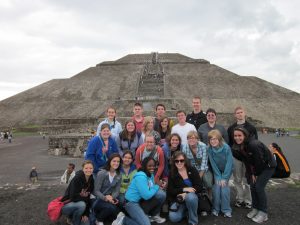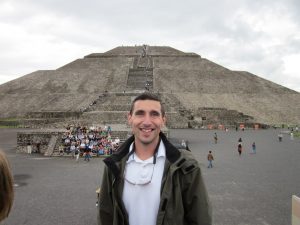
In Mexico where I acted as instructor and international relations coordinator with a group of Honors Students studying abroad
I bring my training, findings, and enthusiasm for research into the classroom. Students in my courses examine empirical data, conduct small-scale research experiments, and learn the fundamentals of quantitative methods. By working with hands-on linguistic data they build analytical skills and develop their capacity to think critically. Recently, I designed a course entitled Bilingualism in the Spanish Speaking World. In this course, students develop extensive knowledge on the cognitive processes associated with bilingualism and a thorough understanding of the social, political, and historic factors responsible for the creation of bilingual societies. I have also taught a number of other linguistics courses, including Spanish Phonetics, Introduction to Linguistics, and Structure of the Spanish Language. I have developed a number of courses, such as Spanish in the United States and Introduction to Romance Linguistics.
In these recent courses, students receive CITI training, IRB Human Subjects approval, PRAAT software and SPSS tutorials, and collect data on the local variety of Spanish for their linguistic analysis and final research paper. Some of these students have expanded the projects that they initiated in class and presented their papers at conferences such as Spanish Linguistics in North Carolina and the Hispanic Linguistics Symposium.
At the graduate level, I have taught a course on Linguistic Fieldwork as well as Research and Practice in Classroom Second Language Acquisition. From the beginning, I offer students hands-on training and help them develop skills that will allow them to be successful in their chosen profession. For example, in my Research and Practice in Classroom Second Language Acquisition class, designed primarily for students who will teach entry-level language courses in the Department, we not only discuss the current theories of instructed SLA but also engage in various activities to prepare them for teaching and a future job search. For example, students conduct peer-observations, write sample lesson plans, conduct teaching demonstrations, and produce a final teaching portfolio. Graduate students in the Linguistic Fieldwork course develop a range of tools and practices in the field to produce an original research study, incorporating current statistical methods and computer programming in their analyses of corpora and linguistic data.
I am the co-founder and leading director of the Study of Communities, Involvement & Outreach and Linguistics (SoCIOLing) Laboratory. Through this initiative, I mentor and conduct research with a number of undergraduate and graduate students.
TEACHING AREAS
- Sociolinguistics
- Second Language Acquisition & Pedagogy
- General Linguistics
- Syntax
- U.S. Spanish/Bilingualism
COURSES TAUGHT
University of Mississippi
- Research and Practice in Classroom Second Language Acquisition (SPAN 672)
- Spanish Phonetics and Phonology (SPAN 572)
- Introduction to Linguistics (LING 313)
- Advanced Spanish Grammar and Composition (SPAN 371)
- Spanish Conversation and Composition (SPAN 303)
East Carolina University
- Spanish in the United States (SPAN 4700)
- Bilingualism in the Spanish Speaking World (SPAN 4700)
- Spanish Phonetics (SPAN 3225)
- Structure of the Spanish Language (SPAN 3335)
- Introduction to Linguistics (FORL 2760)
- Introduction to Romance Linguistics (FORL 2760)
- Advanced Spanish Composition (SPAN 3330)
- Introductory Spanish III (SPAN 2003)
- Introductory Spanish II (SPAN 1002)
- Introductory Spanish I (SPAN 1001)
Indiana University
- Introduction to Hispanic Linguistics (HISP-S 326)
- Spanish Grammar in Context (HISP-S 280)
- Elementary Spanish II (HISP-S 150)
- Elementary Spanish I (HISP-S 100)
- First-Year Advanced Spanish (HISP-S 105)
- Advanced Spanish Grammar (HPFL 250), Study Abroad in San Luis Potosí, México

